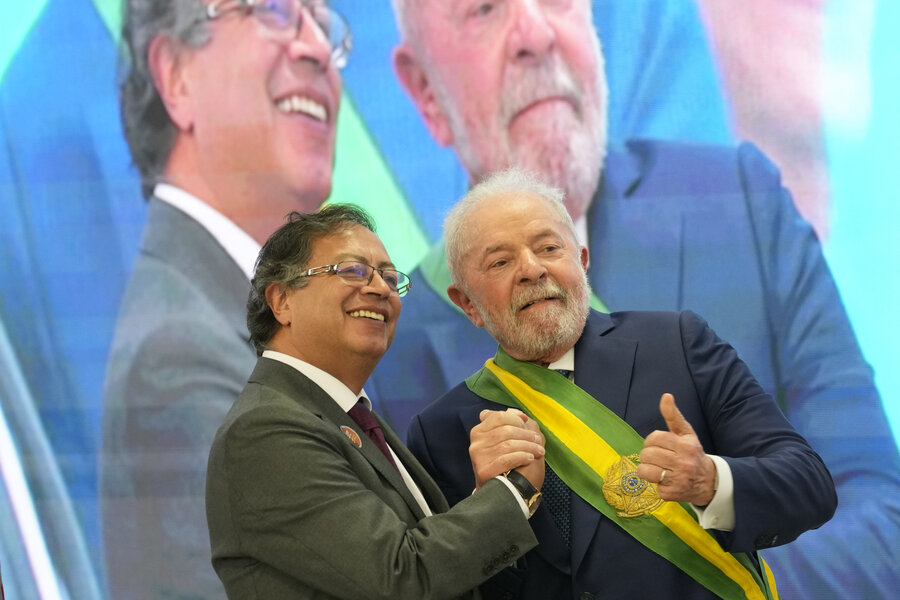Presidents of Brazil, Colombia meet to promote climate summit
Loading...
| Rio de Janeiro
Brazil’s President Luiz Inácio Lula da Silva on Saturday met with his Colombian counterpart Gustavo Petro to build momentum for an upcoming regional summit on the Amazon rainforest and enhance efforts for its protection.
The encounter took place in Colombia’s Leticia, a town in the Amazon’s triple border region between Colombia, Brazil, and Peru, where organized crime has recently increased its hold.
The meeting aimed to lay groundwork for the Amazon Summit the Brazilian government is organizing in Belém next month. That summit will be attended by leaders of the countries party to the Amazon Cooperation Treaty Organization, made up of Bolivia, Brazil, Colombia, Ecuador, Guyana, Peru, Suriname, and Venezuela.
Mr. Lula is pushing for a joint declaration from the summit, which would be presented at the United Nation’s climate conference, known as COP28, in Dubai in November.
“We will have to demand together that rich countries fulfill their commitments,” Mr. Lula said in Leticia, sitting next to Mr. Petro.
Mr. Petro also stressed the need for a common front to exert pressure on developed countries. “We believed that progress was the destruction of trees. ... Today that is nothing other than the destruction of life,” he said.
The Colombian leader said tackling the climate crisis will require spending trillions of dollars. This could be achieved by transforming the global debt system and “trading debt for climate action,” he said.
The final document will comprise measures for the sustainable development of the Amazon, protecting the biome, and promoting social inclusion, science, technology, and innovation while valuing Indigenous peoples and their knowledge, Brazil’s presidential palace said in a statement.
“Joint action of the countries that share the Amazon biome is fundamental for facing the multiple challenges in the region,” the statement said.
One challenge faced is the tightened grip of organized crime, particularly in tri-border regions like where Leticia is located. British journalist Dom Phillips and Indigenous activist Bruno Pereira were killed in the neighboring Javari valley region last year.
These areas have become “violent hotspots,” according to a report by the UN Office on Drugs and Crime released in June. It noted criminal groups are simultaneously engaged in cocaine production trafficking, as well as natural resource exploitation.
Indigenous groups are “disproportionately affected” by the criminal nexus in the Amazon, the report added, pointing to forced displacements, mercury poisoning, and other health-related impacts as well as increased exposure to violence.
In 2019, Colombia, Bolivia, Ecuador, Brazil, Peru, Guyana, and Suriname signed the Leticia Pact to strengthen coordinated actions for the preservation of the natural resources of the Amazon.
But the goals are vague and lack ways to measure progress, said Marcio Astrini, executive secretary of the Climate Observatory, an umbrella organization of environmental groups.
“It’s a letter of ambitions. We hope that in Leticia [Mr. Lula and Mr. Petro] will increase and clarify their ambitions,” said Mr. Astrini.
Since taking office in January, Mr. Lula has strived to put environmental protection and respect for Indigenous peoples’ rights at the heart of his third term. He successful pursued resumption of international donations for the Amazon Fund that combats deforestation, launched a military campaign to eject illegal miners from Yanomami territory, committed to ending all illegal deforestation by 2030, and restarted the demarcation of Indigenous areas.
Mr. Lula’s approach contrasts sharply with the actions of his predecessor, Jair Bolsonaro. Under the far-right leader’s term, deforestation soared to a 15-year high, and environmental restrictions were weakened. Deforestation fell by 33.6% during the first six months of Mr. Lula’s term, according to satellite data the Brazilian government released this week from the National Institute for Space Research, a federal agency.
Mr. Petro has also been vocal about the need to halt destruction in the Amazon. The Colombian leader has proposed the creation of multilateral 20-year financing fund to support farming communities contributing to deforestation. The idea is to compensate them for conservation and regenerative activities instead.
Historically, collaboration between Brazil and Colombia, which share a border longer than 1,500 kilometers (about 900 miles), has been lacking, according to Wagner Ribeiro, a geographer and expert in environmental policy from the University of Sao Paulo.
“We hope that opportunities for academic cooperation will arise from the meeting, which will later generate public policies that promote environmental conservation,” Mr. Ribeiro said.
This story was reported by The Associated Press. AP writer Gabriela Molina in Quito, Ecuador, contributed to this report.







